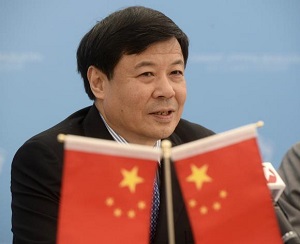Bắc Kinh: IMF Đánh Giá Sai Tình Hình Kinh Tế Của Trung Quốc
Ngày 12/04/2014 Thứ trưởng Tài chính Trung Quốc, Chu Quang Diệu chỉ trích Quỹ Tiền Tệ Quốc Tế (IMF) thiếu tính chuyên nghiệp khi đánh giá về tình hình kt và tài chính nước này. Trong tuần IMF cảnh cáo Bắc Kinh trước nguy cơ kinh tế Trung Quốc « hạ cánh nặng nề » và kèm theo đó là những hậu quả tai hại.
Đang có mặt tại Washington để tham dự các cuộc họp với Quỹ Tiền tệ Quốc tế (IMF) và Ngân hàng Thế giới (WB) và cuộc họp cấp bộ truởng nhóm G20, ông Chu Quang Diệu đã phản đối báo cáo của IMF về viễn cảnh tăng trưởng của Trung Quốc, về rủi ro nợ xấu đe dọa nền kinh tế thứ hai trên thế giới.
Thứ trưởng Tài chính Trung Quốc bất đồng với những phương pháp làm việc của IMF và cho rằng đã tới lúc Quỹ Tiền tệ Quốc tế cần phải « căn cứ vào các số liệu thực sự và thực tế để phản ánh trung thực » tình hình kinh tế tại một quốc gia. Phản ứng nói trên của quan chức Trung Quốc này được ghi nhận sau khi bà Christine Lagarde, giám đốc IMF hôm 10/04/2014 kêu gọi Bắc Kinh tự do hóa thị trường tài chính, chấn chỉnh ngành ngân hàng và nhất là đề cao cảnh giác trước nguy cơ khủng hoảng nợ xấu và hệ thống tài chính không chính thức bị sụp đổ. Phía Bắc Kinh giải thích là chủ tịch Tập Cận Bình ý thức được tất cả những mối đe dọa tiềm tàng đó và Trung Quốc đã bắt đầu đưa ra nhiều biện pháp cải tổ.
Bất đồng trong nhóm G20
Vẫn tại Washington, các Bộ trưởng Kinh tế của nhóm G20 đã ra về mà không tìm được đồng thuận về chiến lược tăng trưởng và kế hoạch cải tổ IMF. Trong thông cáo kết thúc kỳ họp, các bên nhắc lại quyết tâm đẩy mạnh tăng trưởng trong 5 năm tới. Nhưng nhóm G20 bất đồng về giải pháp để đem lại sự tăng trưởng đó.
Úc, Anh và Đức thì chủ trương kích cung để đem lại thịnh vượng kinh tế cho thế giới. Trong khi đó thì Brazil lại chú trọng vào mục tiêu kích cầu, cải thiện mãi lực của các tầng lớp trung lưu để tạo đà cho kinh tế đi lên. Riêng Hoa Kỳ bị chỉ trích gây trở ngại trong tiến trình cải tổ Quỹ Tiền tệ Quốc tế – nâng mức đóng góp cho định chế tài chính đa quốc gia này – đặc biệt là vào lúc cộng đồng quốc tế thúc giục IMF hỗ trợ tài chính cho Ukraina.
BCE cảnh cáo nguy cơ giảm phát
Cũng tại Washington thống đốc Ngân hàng Trung ương Châu Âu (BCE) ông Mario Draghi vào hôm qua đã gián tiếp tiết lộ là định chế tài chính Châu Âu này sẵn sàng can thiệp để làm giảm giá đồng euro so với đô la Mỹ. Giải pháp này càng thích hợp vào thời điểm mà khối sử dụng đồng tiền chung Châu Âu bị đe dọa giảm phát. Nếu BCE thực sự áp dụng chính sách này thì đây là một sự kiện hiếm thấy bởi vì từ trước tới nay, Ngân hàng Trung ương Châu Âu luôn chủ trương giữ lãi suất ngân hàng ở một mức tương đối cao vì muốn tránh lạm phát bằng mọi giá.
Thanh Hà
Beijing Rejects IMF’s Hard-Landing Warning For China’s Economy
(Reuters) – A senior Chinese official hit back on Saturday at International Monetary Fund warnings that China’s economy faced the danger of a hard landing due to poor asset quality, saying the government was taking action to deal with financial risk.
Chinese Vice Finance Minister Zhu Guangyao said China worked closely with the IMF but did not agree with all of its analysis.
“In general, we think they are a very professional financial institution, but some of the methodology used and some traditional thinking, they also need reform,” he told a small group of Western journalists on the sidelines of the IMF and World Bank spring meetings in Washington.
“We hope that their analysis and methodology can really reflect a country’s reality,” he said. “We said not just to the IMF, but also to the World Bank, that not one size fits all. If your policy suggestion is (to be) a valuable suggestion, you must base it on reality.”
IMF Managing Director Christine Lagarde warned of the risk of what she termed a “hard landing” in China, the world’s second-largest economy, and negative repercussions on other emerging markets in her Global Policy Agenda released at the start of the meetings in Washington on Thursday.
While her report said the risk was small, it urged China to rein in risks in its shadow banking system and liberalize its financial sector to improve the allocation of credit.
Zhu said Chinese President Xi Jinping had publicly recognized that China faced a challenge over the issue of shadow banks.
“We are beginning to take action, including strengthening management, monitoring and supervision,” he said, adding that he believed China had handled the situation well, having drawn lessons from the 2008 collapse of Lehman Brothers.
“Compared with how the U.S. and the Europeans handled Lehman Brothers and the sovereign debt issue, we think that China is the most successful – so far!” he said.
‘PICTURE IS VERY CLEAR’
Zhu said state-owned investment companies known as local-government financing vehicles were already nationally audited to clarify what was government debt and what was government-guaranteed debt.
“The picture is very clear,” he said. “Now we are facing the challenge, strengthening the management on the local government financing vehicle issue.”
Zhu echoed other policymakers in describing a recent decline in the Chinese yuan, or renminbi, against the dollar as a result of market forces and said it was not a one-way phenomenon.
“We hope that with the change of supply and demand, the renminbi exchange rate can fluctuate up or down,” he said.
The weakening of the yuan prompted worries in Washington that China’s resolve to let market forces guide its currency was weakening.
In her report, Lagarde offered a different view. “I took the recent increase of the band of the renminbi as the move in the direction of internationalization. I won’t characterize it as an intended depreciation of the currency,” she said.
Overall, Lagarde’s report urged countries to do more to boost growth.
Beijing’s economy has been slowing, but it has been at pains to play down market speculation that it might launch a large stimulus package, saying instead that it would fine-tune policies to ensure unemployment did not rise.
On Thursday, Yi Gang, a vice governor of the People’s Bank of China, said in Washington that China’s government and central bank should be “very cautious” in implementing any stimulus programs because they tended to be less efficient than natural market forces in boosting growth.
Zhu said China had recognized the need to change the speed of growth and added that a four-trillion-yuan stimulus package launched in 2008 had worsened the country’s environmental problems, which needed to be dealt with.
He said that after the years of fast growth, key priorities were to create jobs and improve living conditions. He said the government was addressing such issues by providing tax relief for small business and investing in housing and rural railways.
Zhu rejected the views of some analysts who link a government anti-corruption drive with the economic slowdown.
“We think anti-corruption is a very important job,” he said. It’s a fundamental principle for any government that it must be a clean government. They must serve the people.”
(Reporting by David Brunnstrom; Editing by Paul Simao)














































